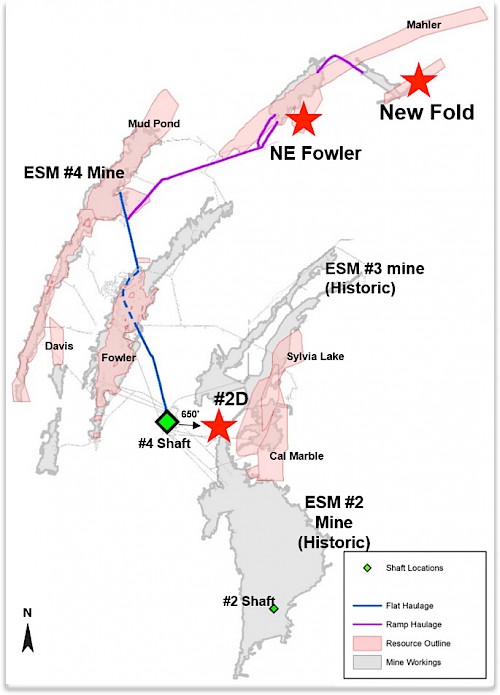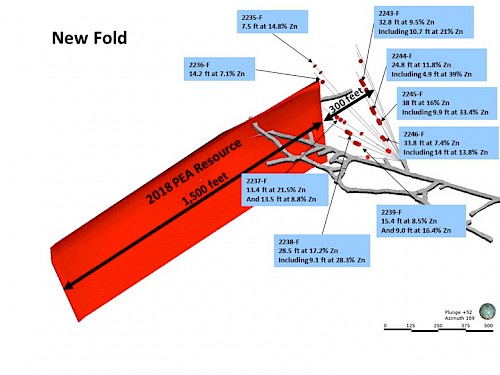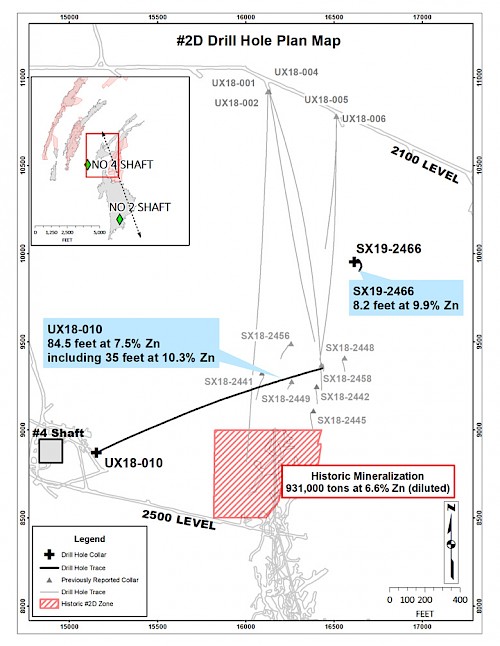Related Document
Vancouver, B.C., April 1, 2019 – Titan Mining Corporation (TSX:TI) (“Titan” or the “Company”) today provided an update on its exploration program at the Empire State Mine (“ESM”). The update includes drilling results from four near-mine mineralized zones: New Fold and NE Fowler at ESM #4 mine, #2D which is an extension of the large #2 mine, and #1D, which lies stratigraphically below.
Significant mineralized intercepts(1) include:
- New Fold:
- 38.0 feet assaying 16.0% zinc
- Including 9.9 feet assaying 33.4% zinc
- 24.8 feet assaying 11.8% zinc
- Including 4.9 feet assaying 39.0% zinc
- 32.8 feet assaying 9.5% zinc
- Including 10.7 feet assaying 21.0% zinc
- 13.4 feet assaying 21.5% zinc
- 28.5 feet assaying 17.2% zinc
- Including 9.1 feet assaying 28.3% zinc
- 38.0 feet assaying 16.0% zinc
- #2D and #1D:
- 84.5 feet assaying 7.5% zinc (#2D)
- Including 35.0 feet assaying 10.3% zinc
- 8.2 feet assaying 9.9% zinc (#1D)
- 84.5 feet assaying 7.5% zinc (#2D)
- NE Fowler:
- 27.3 feet assaying 5.7% zinc
- Including 4.7 feet assaying 13.8% zinc
- 12.7 feet assaying 6.4% zinc
- 27.3 feet assaying 5.7% zinc
New Fold Zone
An 18-hole underground exploration program was carried out in early 2019. The program was designed to test the southern extension of the mineralization in the New Fold zone. The drilling confirms that high-grade zinc mineralization extends at least 300 feet up-plunge from the mineral resource included in the 2018 PEA(2). The mineralization in the New Fold zone now extends over 1,800 feet from southwest to northeast, and remains open to the northeast.
- Widths provided are drill intercepts and not true widths for the zones.
- Refer to the technical report entitled “NI 43-101 Preliminary Economic Assessment Updated Technical Report, Empire State Mines, Gouverneur, New York, USA”, dated May 24, 2018 (“2018 PEA”); the mineral resource estimate in the 2018 PEA is dated January 31, 2018.
#2D and #1D Zones
Underground infill drilling continues to define the continuity of high-grade mineralization in the central portion of the #2D mineralized zone. In this area, the zone is 50 feet to 100 feet thick along a defined fold hinge which extends approximately 1,500 feet northeast from the historic mineralization. The recent drill holes also intercepted high-grade mineralization in the #1D zone, located approximately 275 feet below the #2D zone. Drilling results indicate that the grade of the mineralization in the #1D zone increases to the northeast and the zone remains open in that direction.
NE Fowler Zone
In 2018, 14 holes totaling approximately 16,200 feet were drilled to test the up-plunge extension of the mineralization at the NE Fowler zone, and to upgrade the 2018 PEA resource classification from the inferred category to the indicated category. The drill program demonstrated the up-plunge continuity of mineralization. Drilling also indicated that the mineralization thickens to the west and north, and remains open in both directions. Based on the current drill results, it appears that the thicker and higher-grade portion of the NE Fowler mineralized zone is situated further to the north/northwest and will be the target of future drilling.
2019 Exploration Program
The exploration program at ESM remains focused on testing targets that have the potential to host high-grade, large-tonnage deposits. These targets include historic mined areas such as the Edwards mine, and several prospects with coincident soil and geophysical anomalies.
“The surface and underground exploration drilling programs continue to expand the mineralized zones at ESM,” said Scott Burkett, Vice President, Exploration. “The drilling results indicate that the mineralized zones being targeted have grown in size and remain open along strike. Continued drilling is expected to increase the mineral resources and add to the mine life at ESM.”
Donald Taylor, Chief Executive Officer of Titan, commented, “We are encouraged by the results of our step-out drilling at New Fold. This is a higher-grade zone which could contribute to near-term production. Both New Fold and the #2D zone are being incorporated in our revised mine plan which is expected to be completed mid-year. Our team remains focused on underground development at ESM in addition to exploring this highly-prospective district.”
Drill holes 2237-F, 2238-F and 2239-F were part of a six-hole underground fan targeting the New Fold zone. The holes extend high-grade mineralization approximately 150 feet up-plunge from the 2018 PEA mineral resource. Intercepts from the three holes are vertically spaced approximately 70 feet apart.
Notable mineralized intervals from 2237-F were:
- 13.4 feet assaying 21.5% zinc
- 13.5 feet assaying 8.8% zinc
A noteworthy mineralized interval from 2238-F was:
- 28.5 feet assaying 17.2% zinc
- Including 9.1 feet assaying 28.3% zinc
Notable mineralized intervals from 2239-F were:
- 15.4 feet assaying 8.5% zinc
- 9.0 feet assaying 16.4% zinc
Drill holes 2243-F, 2244-F, 2245-F and 2246-F were drilled from underground and are part of a seven-hole fan targeting the New Fold zone. The holes demonstrate the continuity of high-grade mineralization and extend the zone 300 feet up-plunge from the 2018 PEA resource. Intercepts from the four holes are vertically spaced approximately 70 feet apart.
A noteworthy mineralized interval from 2243-F was:
- 32.8 feet assaying 9.5% zinc
- Including 10.7 feet assaying 21.0% zinc
A notable mineralized interval from 2244-F was:
- 24.8 feet assaying 11.8% zinc
- Including 4.9 feet assaying 39.0% zinc
A noteworthy mineralized interval from 2245-F was:
- 38.0 feet assaying 16.0% zinc
- Including 9.9 feet assaying 33.4% zinc
A notable mineralized interval from 2246-F was:
- 33.8 feet assaying 7.4% zinc
- Including 14.0 feet assaying 13.8% zinc
UX18-010 is a horizontal infill hole drilled underground from the 2500 level. The drill hole targeted the central portion of the mineralization at the #2D zone where the greatest thicknesses and highest grades have been observed. The drill hole confirms the grade and thickness of mineralization in both the upper and lower #2D horizons. Notable mineralized intervals were:
- 84.5 feet assaying 7.5% zinc (#2D)
- Including 35.0 feet assaying 10.3% zinc
- 22.2 feet assaying 7.2% zinc (#2D)
SX19-2466 is a vertical hole drilled from surface. The drill hole had a significant intercept in the #1D zone. The hole indicates that the grade of the mineralization increases to the northeast and remains open in that direction. A noteworthy mineralized interval was:
- 8.2 feet assaying 9.9% zinc
2227-F is an inclined underground drill hole targeting NE Fowler mineralization. The drill hole intercepted two mineralized horizons which remain open to the west. The results suggest that the main part of the NE Fowler mineralization may not yet have been identified. Notable mineralized intervals were:
- 5.6 feet assaying 6.3% zinc
- 27.3 feet assaying 5.7% zinc
- Including 4.7 feet assaying 13.8% zinc
2231-F is an inclined underground hole, drilled 570 feet north of 2227-F, targeting NE Fowler mineralization. The drill hole intercepted one significant mineralized interval and remains open to the north. A noteworthy mineralized interval was:
- 12.7 feet assaying 6.4% zinc
For a full list of the New Fold, #2D, #1D and NE Fowler mineralized intervals from these holes, refer to Tables 1 and 2.
Table 1 – Recent Exploration Drill Results from New Fold Zone at ESM
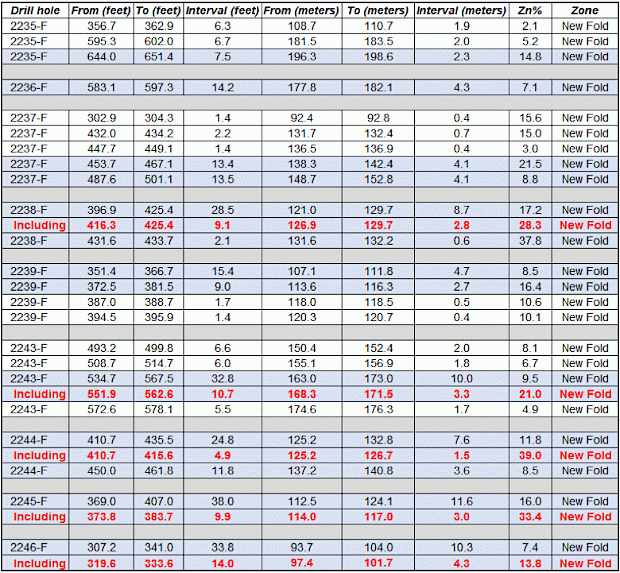
Note: It is not possible to determine the true width of the zone(s) based on the drill density and no representation is made here regarding true width of the zone(s).
Table 2 – Recent Exploration Drill Results from NE Fowler, #2D and #1D Zones at ESM
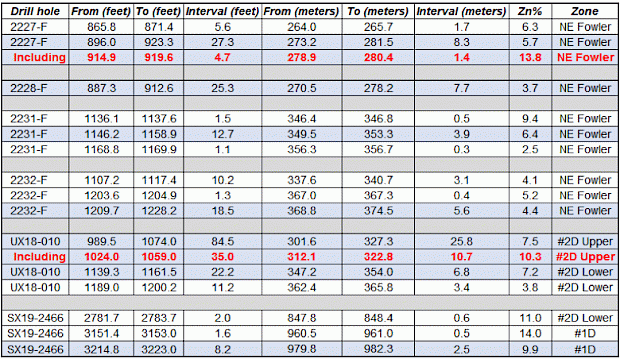
Note: It is not possible to determine the true width of the zone(s) based on the drill density and no representation is made here regarding true width of the zone(s).
Figure 1 – Plan View of Select Near-Mine Mineralized Zones
Figure 2 – Isometric View (Looking Southwest) of New Fold Step-Out Drilling and Selected Significant Mineralized Intervals
Figure 3 – Plan View of #2D Zone Showing Drill Hole Locations
Qualified Person
The results of the Titan drilling have been reviewed, verified and compiled by Donald R. Taylor, MSc., PG, Chief Executive Officer of Titan, a qualified person as defined by National Instrument 43-101 (NI 43-101). Mr. Taylor has 30 years of mineral exploration and mining experience, and is a Registered Professional Geologist through the SME (registered member #4029597).
Assays and Quality Assurance/Quality Control
To ensure reliable sample results, the Company has a rigorous QA/QC program in place that monitors the chain-of-custody of samples and includes the insertion of blanks and certified reference standards at statistically derived intervals within each batch of samples. Core is photographed and split in half with one-half retained in a secured facility for verification purposes.
Sample preparation (crushing and pulverizing) has been performed at ALS Geochemistry, an ISO/IEC accredited lab located in Sudbury, Ontario, Canada. ALS Minerals Laboratories prepares a pulp of all samples and sends the pulps to their analytical laboratory in Vancouver, B.C., Canada, for analysis. ALS analyzes the pulp sample by an aqua regia digestion (ME-ICP41 for 35 elements) with an ICP – AES finish including Cu (copper), Pb (lead), and Zn (zinc). All samples in which Cu (copper), Pb (lead), or Zn (zinc) are greater than 10,000 ppm are re-run using aqua regia digestion (Cu-OG46; Pb-OG46; and Zn-OG46) with the elements reported in percentage (%). Silver values are determined by an aqua regia digestion with an ICP-AES finish (ME-ICP41) with all samples with silver values greater than 100 ppm repeated using an aqua regia digestion overlimit method (Ag-OG46) calibrated for higher levels of silver contained. Gold values are determined by a 30 g fire assay with an ICP-AES finish (Au-ICP21).
About Titan Mining Corporation
Titan is an Augusta Group company which produces zinc concentrate at its 100%-owned Empire State Mine (“ESM”) located in New York State. ESM is a group of zinc mines which started production in the early 1900s. Titan is built for growth, focused on value and committed to excellence. The company’s shares are listed under the symbol "TI" on the Toronto Stock Exchange. For more information on the Company, please visit our website at www.titanminingcorp.com.
Contact
For further information, please contact:
Jacqueline Allison – Vice President, Investor Relations and Strategic Analysis
Telephone: 416-366-5678 Ext. 205 | Email: jallison@titanminingcorp.com
Cautionary Note Regarding Forward-Looking Information
This press release contains certain forward-looking statements. Words such as “expects”, “anticipates” and “intends” or similar expressions are intended to identify forward-looking statements. Forward-looking information is necessarily based on a number of opinions, assumptions and estimates that, while considered reasonable by the Company as of the date of this press release, are subject to known and unknown risks, uncertainties, assumptions and other factors that may cause the actual results, use of proceeds or timing of events to be materially different from those expressed or implied by such forward-looking information, including but not limited to the factors described in greater detail in the Company’s Management’s Discussion and Analysis and Annual Information Form for the year ended December 31, 2018, available at www.sedar.com. No securities regulatory authority has expressed an opinion about the securities described herein and it is an offence to claim otherwise. Titan undertakes no obligation to publicly update or revise any forward-looking statements, whether as a result of new information, future events or otherwise, except as may be required by law.

